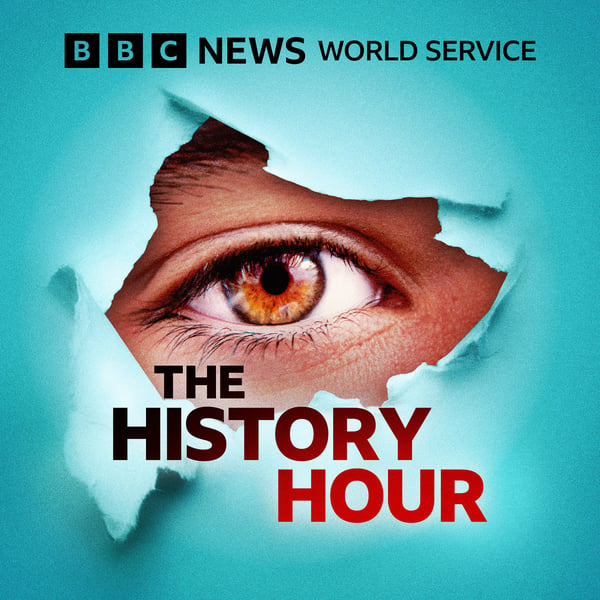The creation of Ghana's flag and the oldest person at primary school
The History Hour
BBC
4.4 • 879 Ratings
🗓️ 13 October 2023
⏱️ 51 minutes
🧾️ Download transcript
Summary
Max Pearson presents a collection of this week’s Witness History episodes from the BBC World Service.
We hear from Kwasi Okoh about how his mother Theodosia Okoh designed Ghana’s flag after it became the first country in sub-Saharan Africa to gain independence.
Our guest, former diplomatic and foreign affairs editor, Tim Marshall, explains the importance of flags for national identity and their changing purpose through history. We also learn about the moment in 1966 when Kwame Nkrumah, one of Africa's most famous leaders, was ousted from power in Ghana.
Plus, how in 2013, India's Supreme Court made a landmark ruling aimed at transforming the lives of acid attack survivors. It followed a campaign led by Laxmi Agarwal who at the age of 15 was burned when acid was thrown at her.
And the artist Yinka Shonibare discusses how ‘Nelson’s Ship in a Bottle’ exhibited in London’s Trafalgar Square was the world’s largest ship in a bottle.
And finally, how Kimani Maruge became the oldest man to enroll at a primary school in Kenya.
Contributors: Kwasi Okoh - son of Theodosia Okoh Tim Marshall - former diplomatic and foreign affairs editor for Sky News Chris Hesse - Ghanaian filmmaker Laxmi Agarwal - acid attack survivor Yinka Shonibare - creator of Nelson’s Ship in a Bottle Jane Obinchu - Kimani Maruge’s former teacher
(Photo: Ghanaian football fans wave their national flag. Credit: Getty Images)
Transcript
Click on a timestamp to play from that location
| 0:00.0 | The explanation is the podcast from the BBC World Service that goes beyond the spin, |
| 0:06.7 | exploring the important questions about long-running stories and the latest global news an honest explanation of the events shaping |
| 0:16.4 | our lives. Search for the explanation wherever you get your BBC Podcasts. |
| 0:25.0 | Hello and welcome to the History Hour Podcast from the BBC World Service with me Max Pearson, the past brought to life by those who were there. |
| 0:36.0 | This week the dreadful impact of an acid attack on a girl in India. |
| 0:40.0 | I told them please I don't want to live anymore. Then my father hugged me and said |
| 0:47.2 | my daughter nothing is impossible in this world. |
| 0:52.0 | Also fitting in the 84-year-old at a primary school in Kenya. |
| 0:56.0 | He could follow the ball with his walking stick and try to kick it with a working street. Very popular. |
| 1:05.0 | Plus, art to make us question our understanding of history. |
| 1:09.0 | And the moment in 1966 when Ghana's President Kwame and Kruma was ousted in a coup whilst out of the country. |
| 1:15.5 | Any time we flew out. |
| 1:17.7 | I think it was at the back of his mind. |
| 1:19.7 | Anything could happen. |
| 1:21.5 | He had postponed that trip on three occasions. |
| 1:25.0 | That's all coming up in today's podcast and it's in Ghana that we're going to start. |
| 1:29.6 | In March 1957, the West African country became the first in the region to gain independence, and a new flag was unveiled marking a fresh start for the former British colony, and it's the flag that we're going to focus on. |
| 1:42.0 | The woman behind the design was Theodosia Oko, an artist who won a competition to design an emblem which would signify the end of British rule. Theodosia's son, Quasi Oko, has been speaking to Rina Stanton Sharma about the inspiration The The flag had been designed to commemorate the independence of Ghana. |
| 2:08.0 | It was to usher in the new Ghana. |
| 2:12.0 | It was a Ghana moment rather than my mother's moment. |
| 2:15.8 | Everybody in Ghana was excited, happy, |
| 2:18.4 | the lot of jubilation, the political vehicles |
... |
Please login to see the full transcript.
Disclaimer: The podcast and artwork embedded on this page are from BBC, and are the property of its owner and not affiliated with or endorsed by Tapesearch.
Generated transcripts are the property of BBC and are distributed freely under the Fair Use doctrine. Transcripts generated by Tapesearch are not guaranteed to be accurate.
Copyright © Tapesearch 2025.

